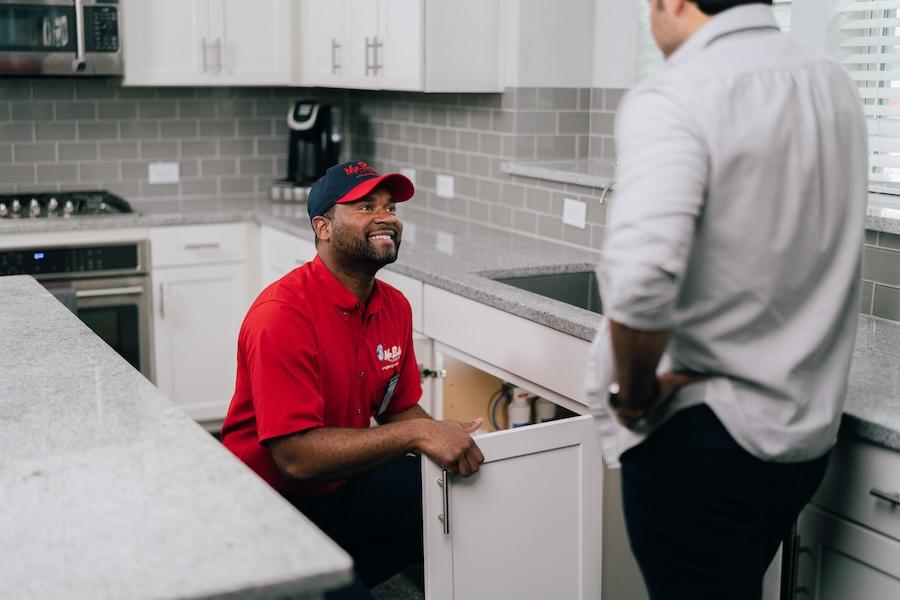Call This Friday to Get $50 OFF
Call us Now to Get $50 OFF.
Ratings based on 6379 reviews
Local Plumbers, Local Reviews
Call This Friday to Get $50 OFF
Call us Now to Get $50 OFF.
Ratings based on 6379 reviews
Local Plumbers, Local Reviews

There’s a certain satisfaction in solving a household problem without reaching for the phone. A slow-draining sink or shower is annoying, and most people will try something before calling a professional. One of the simplest DIY tricks is pouring boiling water down the drain, but does it actually work? Or is it just another piece of bad internet advice? Before you risk damaging your pipes or wasting your time, keep reading. Mr. Rooter Plumbing knows how tempting it is to try home remedies, but we also know when those remedies cross the line from helpful to harmful.
The basic claim is that pouring boiling water down a drain will clear a clog. This is sometimes true, but the full answer depends on what’s causing the blockage. Boiling water can help if the clog is made of organic matter like grease, soap scum, or small food particles. The heat can soften or melt these materials and break them apart to help flush them through the pipe. That’s why this method is most likely to work in kitchen sinks where oil and food waste build up slowly over time. If the clog is dense, old, or made of something solid like hair or food scraps, boiling water won’t be enough. Bathroom drain clogs are usually made of hair combined with soap residue, and the water doesn’t reach high enough temperatures for long enough to dissolve the mass. Another issue is how fast the water moves. Boiling water cools quickly once it hits a room-temperature pipe. If it doesn’t stay hot as it moves through the drain, it may not soften the clog at all. It just runs over it. Boiling water is a partial fix for soft, early-stage clogs, but it definitely isn’t a cure-all.
Before you reach for the kettle, stop and think about your pipes. Boiling water is around 212 degrees Fahrenheit. That’s no problem for metal pipes, but it can cause real trouble for plastic ones made from PVC or older ABS. PVC pipes are technically rated to withstand high heat, but repeated exposure to boiling water can cause them to soften or weaken over time. The fittings and joints are most vulnerable. If they warp, leak, or crack, you’ll have a bigger issue than a slow drain. If you’re not sure what kind of pipes you have, play it safe. Use hot tap water instead of boiling water, or call a plumber in Bloomington, CA for guidance. The last thing you want is to damage your pipes while trying to fix a clog. This is one reason people call a plumbing repair service after trying a DIY fix. When hot water makes things worse or fails to fix the problem, the issue has likely progressed beyond what heat can handle. A trained technician can diagnose the real cause without risking pipe damage.
Other than boiling water, the most common alternatives are to use chemical drain cleaners, plungers, and snakes. All of these come with trade-offs. Chemical drain cleaners may work on minor clogs, but they’re harsh on your plumbing system. They can damage metal and plastic pipes, especially if used often. They’re also dangerous to store, can harm your skin and eyes, and aren’t great for the environment. Plungers are a safe and affordable option, but they are only effective if the clog is close to the drain opening and is caused by something movable, like a wad of hair or a soap clump. If the clog is deeper or more stubborn, a plunger won’t cut it. Drain snakes are usually more effective for physical blockages. These can reach deep into the pipe and break up solid materials, but they’re a bit more involved than boiling water and require some skill to use properly without scratching or damaging the pipe walls. Boiling water, by comparison, is quick, cheap, and low-effort. It’s also limited in what it can resolve. When clogs keep coming back, or when they never clear up completely, the problem is more serious. A drain cleaning service performed by a professional becomes a better choice because it fixes the cause, not just the symptom.
If your drain is slow after trying the basics, it’s time to get help. Repeated DIY attempts might make things worse by pushing the clog deeper or damaging your system. Here are some signs that you need to call a professional:
Boiling water can help with early-stage clogs caused by grease or soap, but it’s not a reliable fix for solid or stubborn blockages, and it can damage certain pipe materials if used too often or without care. When in doubt, don’t risk your plumbing system. If the clog doesn’t budge or keeps coming back, it’s time for expert drain cleaning or a plumbing repair service. Mr. Rooter Plumbing is here to help you solve the problem. Contact our office if you have questions or want to schedule an appointment.
Did you know that multiple pipes run underground in your property, and damage to these pipes is mostly…
Read MoreFor many homeowners, septic maintenance seems confusing and overwhelming. Compared to city sewer systems, how well you maintain…
Read MoreWe all know that septic tanks are meant to handle waste to a certain degree. However, do we…
Read MoreFor homeowners who live in areas that receive heavy rainfall throughout the year, sump pumps aren’t just a…
Read MoreWhen it comes to septic health, you can be one of those homeowners that try to do everything…
Read More